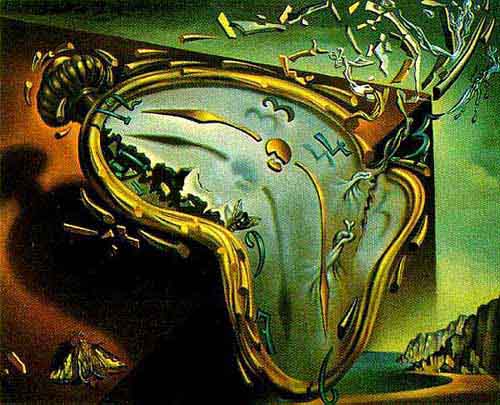
A daunting melting clock made of bronze, resembling a pizza, stands at the entrance of the Shanghai Art Museum, announcing that Salvador Dali is coming in Shanghai again. The enchantment of the surrealist master never fades in Shanghai, despite the fact that the exhibition about him runs nearly every year.
Dali, Picasso and Matisse are recognized as the three most influential artists of the 20th century.
Organized by Dali Universe and the Stratton Foundation, the exhibition titled "Dali in Shanghai" features nearly 300 pieces of art, from sculptures and collage to furniture and illustrations.
The size and quality of the pieces on display at the Shanghai Art Museum are said to be the biggest and best of all recent Dali exhibitions in Shanghai.
The current show already proves Dali's undying ability to shock and irritate the world around him, although he died 20 years ago.
Local visitors are queuing outside the museum, anxious to approach the surreal world inside that he has created.
"Frankly speaking, I am not a person who knows deeply about Western contemporary art history," says Christine Wu, a 30-something office worker with her five-year-old son. "But I just like Dali. There is a certain energy and passion in his works not found in others' that can be profoundly interpreted even by ordinary people."
Her words unwittingly echoed with one of Dali's famous sayings: "I am indifferent to the opinion of others. The only thing that matters is that they speak of Dali, even if they have to speak well of him."
Beniamino Levi, president of the Stratton Foundation, says: "I have curated over 80 Dali shows throughout the world in major international museums. 'Dali in Shanghai' is intended to reveal the foundations that lay beneath Dali's inspired genius, and to offer an understanding of his art and life. It will allow the visitors to delve into the labyrinth of his mind and to view the creative results of his infinite imagination."
The walls of the exhibition hall on the first floor are stamped with some of Dali's sensational quotes as if he was still alive amidst his world, such as: "At the age of three, I wanted to be a female cook. At seven, Napoleon. After that, my ambition just went on growing. I wanted to be Salvatore Dali and nobody else."
The exhibition is divided into three parts: Dreams and Fantasy; Sensuality and Femininity; Religion and Methodology.
Throughout his lifetime, Dali was greatly preoccupied by the accurate portrayal of the true content of his inner mind through his art. He believed dreams were the only true, accurate and meaningful expression of his personality.
An avid follower of Freud, like many others in the surrealist movement, Dali's interest in dreams, meanings and their relationship to complete "freedom" led him to align himself strongly with the beliefs expounded by Freud in his "Interpretation of Dreams."
One of the highlights of the exhibition is a 5-meter-long and 5-meter-wide canvas titled "Spellbound" created by Dali in 1945 at the invitation of Alfred Hitchcock for his movie of the same name. It is the first time the piece has been shown in Shanghai.
Many movie fans may recall the scene when the fake doctor Edward is describing his bizarre dream. The huge canvas featuring a cluster of giant eyeballs functioned as a backdrop of the hero's dream.
Freud's unconscious being composed of repressed sexual desire and sexual drive is also a driving force in Dali's creations.
Fortunately, Dali encountered his inspirational creative muse. Gala, his wife who played a major part in changing his ideas toward femininity and the female form.
Dali was captivated by Gala whom he regarded as the ideal representation of womanhood. The pair remained inseparable until her death in 1982.
The exhibition displays one of Dali's defining classics of surrealism titled "Buste de Femme Retrospectif." It includes several Dalinean recurring images, such as ants and bread. Here, ants are his symbols of anxiety, nervousness and decay while food symbolizes sexual desire.
Perhaps the legend of Dali will go on for another century, just as the master had predicted: "There comes a moment in every person's life when they realize they adore me."
Date: through August 14, 9am-5pm
Address: 325 Nanjing Rd W. Shanghai
Tel: 6327-2829
(Shanghai Daily August 7, 2009)